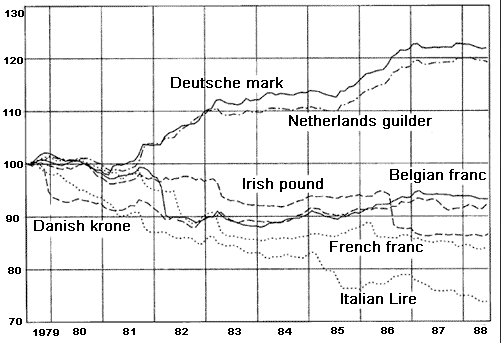Categories Bank
7 days
30 days
All time
Recent
Popular
Last week the @ECB extended its current asset purchase program, now totalling €1.8 tn. Several EU states can borrow at negative interest rates.
10 years ago, the eurozone almost collapsed, a result of a misconstructed currency that was meant to fail from the outset.
A thread👇

1/Before the introduction of the euro, fluctuating exchange rates were seen as threat for economic integration & embarrassment for those who were inflating their currencies faster than others.
The European Monetary System, set up in 1979, was an attempt to stabilise fx rates.
2/The EMS was doomed to fail as members applied different monetary policies while trying to keep their fx rates in a pre-defined corridor.
The German Bundesbank refused to devalue the Mark when other centr. banks inflated their currencies - strengthening the Mark by comparison.

3/Traditionally, Southern EU countries have been more prone to inflation & high debt levels due to a large public sector, strong labour unions & generous pension systems.
Northern countries like Germany & the Netherlands typically had more prudent monetary & fiscal policies.
4/To get rid of the stubbornly conservative Bundesbank & monetise public deficits more easily, Southern countries spearheaded by France pushed for a single currency and used Germany’s desire for reunification in 1989 to make it give up the D-Mark.
10 years ago, the eurozone almost collapsed, a result of a misconstructed currency that was meant to fail from the outset.
A thread👇

1/Before the introduction of the euro, fluctuating exchange rates were seen as threat for economic integration & embarrassment for those who were inflating their currencies faster than others.
The European Monetary System, set up in 1979, was an attempt to stabilise fx rates.
2/The EMS was doomed to fail as members applied different monetary policies while trying to keep their fx rates in a pre-defined corridor.
The German Bundesbank refused to devalue the Mark when other centr. banks inflated their currencies - strengthening the Mark by comparison.

3/Traditionally, Southern EU countries have been more prone to inflation & high debt levels due to a large public sector, strong labour unions & generous pension systems.
Northern countries like Germany & the Netherlands typically had more prudent monetary & fiscal policies.
4/To get rid of the stubbornly conservative Bundesbank & monetise public deficits more easily, Southern countries spearheaded by France pushed for a single currency and used Germany’s desire for reunification in 1989 to make it give up the D-Mark.
Saturday marks the 30th anniversary of German reunification.
— HODLdax (@HODLdax) September 30, 2020
Did you that Germany had to sacrifice its national currency for it?
Let\u2019s look back at the fateful decisions leading to the Euro, a secretive project driven by much political interest and little economic reason.\U0001f447 pic.twitter.com/XcWgBOr29O







